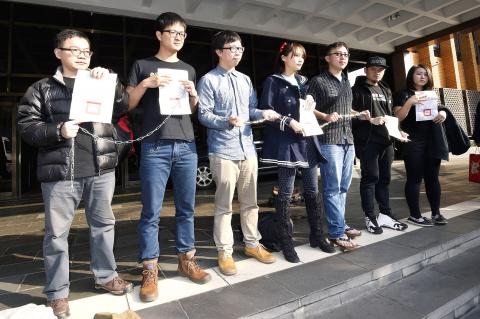The high-profile trial of eight young activists charged over an alleged incident involving China’s Taiwan Affairs Office Minister Zhang Zhijun (張志軍) began yesterday.
On June 26 last year, members of the Black Island National Youth Front allegedly blocked a road by chaining themselves together before Zhang’s tour of New Taipei City’s Wulai District (烏來) — an Atayal Aboriginal village.
Despite being swiftly removed and arrested by police officers, the activists managed to delay Zhang’s visit to the village by 20 minutes.

Photo: Chen Chih-chu, Taipei Times
Eight group members — including students Dennis Wei (魏揚) and Lai Ping-yu (賴品妤) — were indicted last month on criminal charges of coercion (強制罪) and obstruction of public traffic and communication (妨礙公共交通往來).
Group members played a key role in last year’s Sunflower movement, in which student-led protesters in Taipei occupied the legislature’s main chamber for nearly 23 days in March and April over the government’s handling of the cross-strait service trade pact.
The activists yesterday said that while their blockade denied pedestrian and vehicular access to Wulai, their goal was to stop President Ma Ying-jeou’s (馬英九) administration from “incessantly leaning toward China politically and economically.”
They asked if the administration was trying to “prevent ambassadors from the ‘celestial kingdom’ from hearing Taiwanese voices,” using an archaic term for China.
“Since the [Chinese] special ambassador was in Taiwan to discuss important issues involving economic trade — which would create a large impact on people’s livelihoods — why would the government not allow people to express their opinions?” Wei asked.
Lai said that citizens should have the right to express their opinions through protests and demonstrations, and accused the government of abusing its power through judicial channels.
Human rights lawyer Greg Yo (尤伯翔), one of the volunteer lawyers on the case, said that it was “deeply regretful” that the Taipei District Prosecutors’ Office decided to indict the activists, adding that he believed that the court would protect their freedom of speech.
If found guilty, the activists could be sentenced to up to three years in prison for coercion, and up to five years in prison for obstruction of public traffic and communication.

The Ministry of Economic Affairs has fined Taobao NT$1.2 million (US$36,912) for advertisements that exceed its approved business scope, requiring the Chinese e-commerce platform to make corrections in the first half of this year or its license may be revoked. Lawmakers have called for stricter enforcement of Chinese e-commerce platforms and measures to prevent China from laundering its goods through Taiwan in response to US President Donald Trump’s heavy tariffs on China. The Legislative Yuan’s Finance Committee met today to discuss policies to prevent China from dumping goods in Taiwan, inviting government agencies to report. Democratic Progressive Party Legislator Kuo Kuo-wen (郭國文) said

The Ministry of Economic Affairs has fined Taobao NT$1.2 million (US$36,900) for advertisements that exceeded its approved business scope and ordered the Chinese e-commerce platform to make corrections in the first half of this year or its license would be revoked. Lawmakers have called for stricter supervision of Chinese e-commerce platforms and more stringent measures to prevent China from laundering its goods through Taiwan as US President Donald Trump’s administration cracks down on origin laundering. The legislature’s Finance Committee yesterday met to discuss policies to prevent China from dumping goods in Taiwan, inviting government agencies to report on the matter. Democratic Progressive Party

Taiwan and its Pacific ally Tuvalu on Tuesday signed two accords aimed at facilitating bilateral cooperation on labor affairs, according to Taiwan’s Ministry of Foreign Affairs (MOFA). The governments inked two agreements in Taipei, witnessed by Foreign Minister Lin Chia-lung (林佳龍) and visiting Deputy Tuvaluan Prime Minister Panapasi Nelesone, MOFA said in a news release. According to MOFA, the agreements will facilitate cooperation on labor issues and allow the two sides to mutually recognize seafarers’ certificates and related training. Taiwan would also continue to collaborate with Tuvalu across various fields to promote economic prosperity as well as the well-being of their

Sung Chien-liang (宋建樑), who led efforts to recall Democratic Progressive Party (DPP) Legislator Lee Kun-cheng (李坤城), was released on bail of NT$80,000 today amid outcry over his decision to wear a Nazi armband to questioning the night before. Sung arrived at the New Taipei District Prosecutors’ Office for questioning in a recall petition forgery case last night wearing a red armband bearing a swastika, carrying a copy of Adolf Hitler’s Mein Kampf and giving a Nazi salute. Sung left the building at 1:15am without the armband and covering the book with his coat. Lee said today that this is a serious